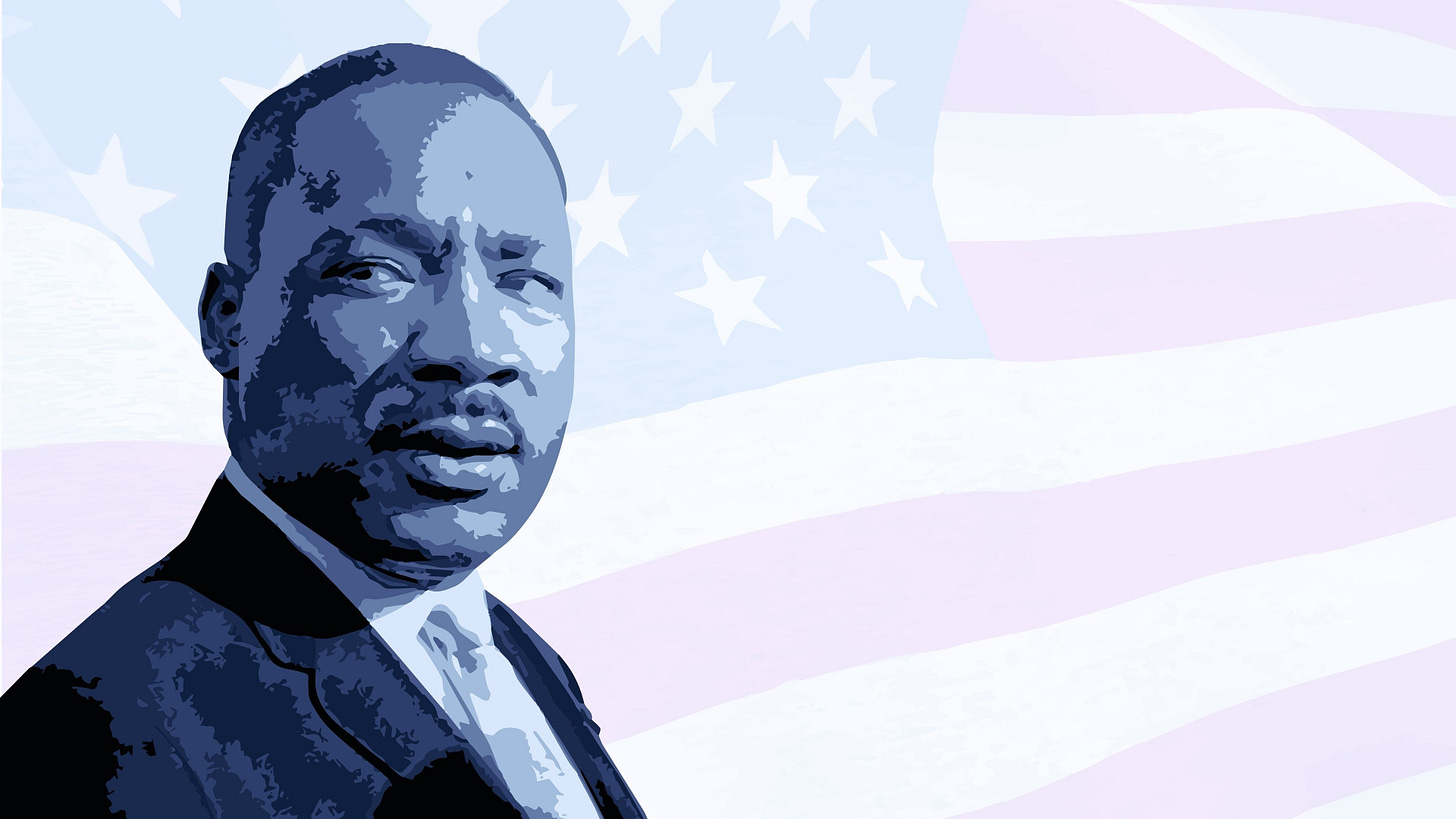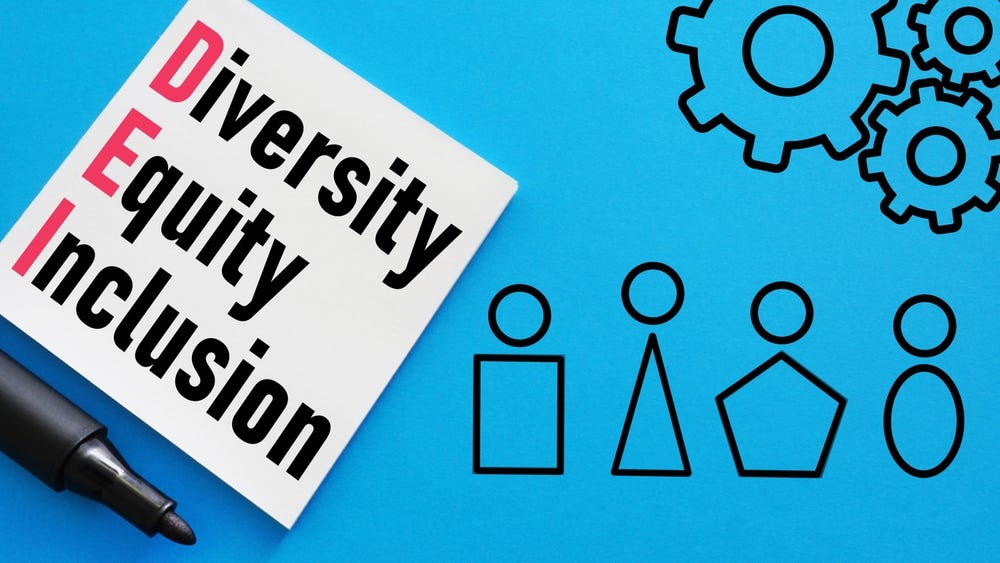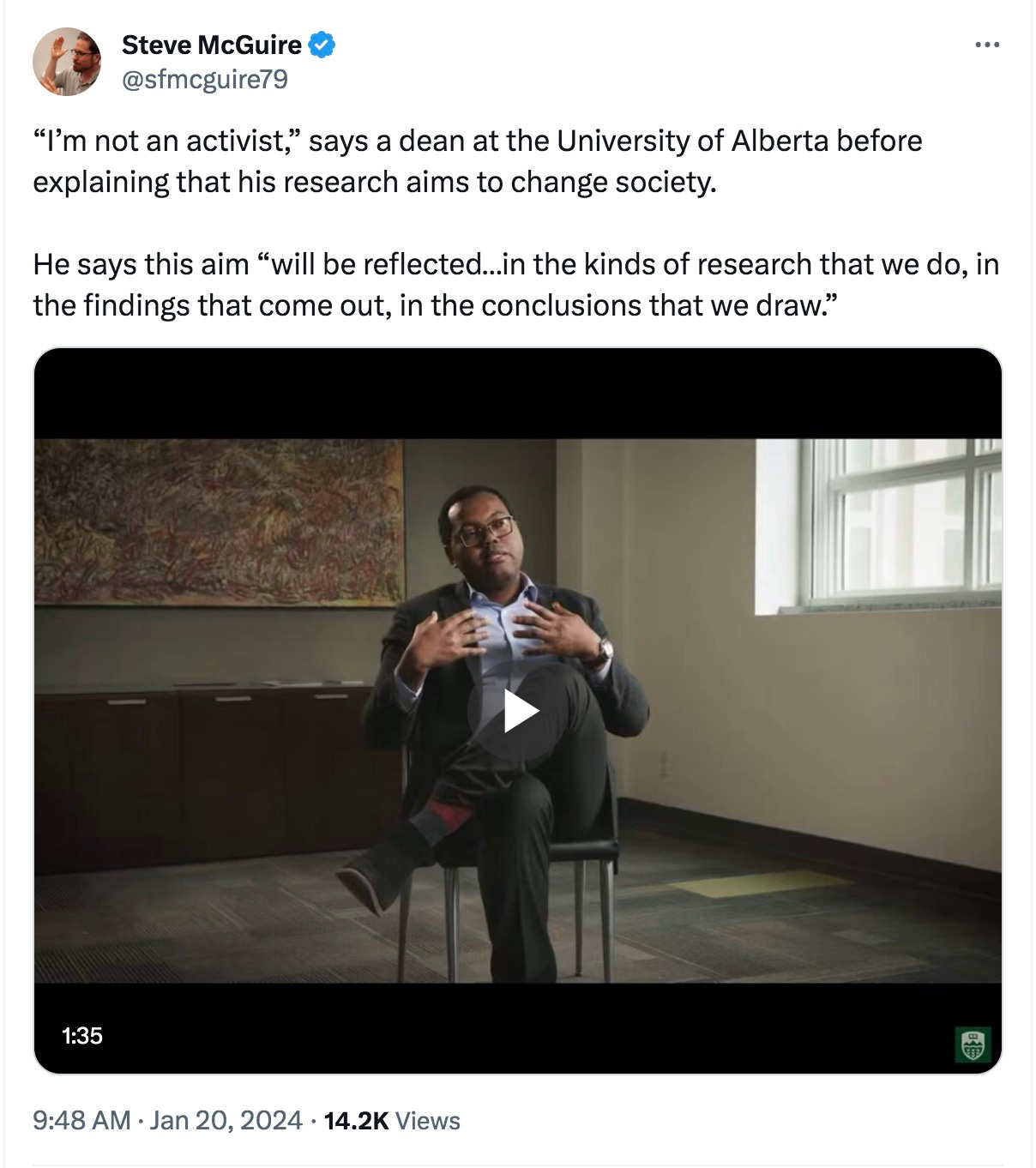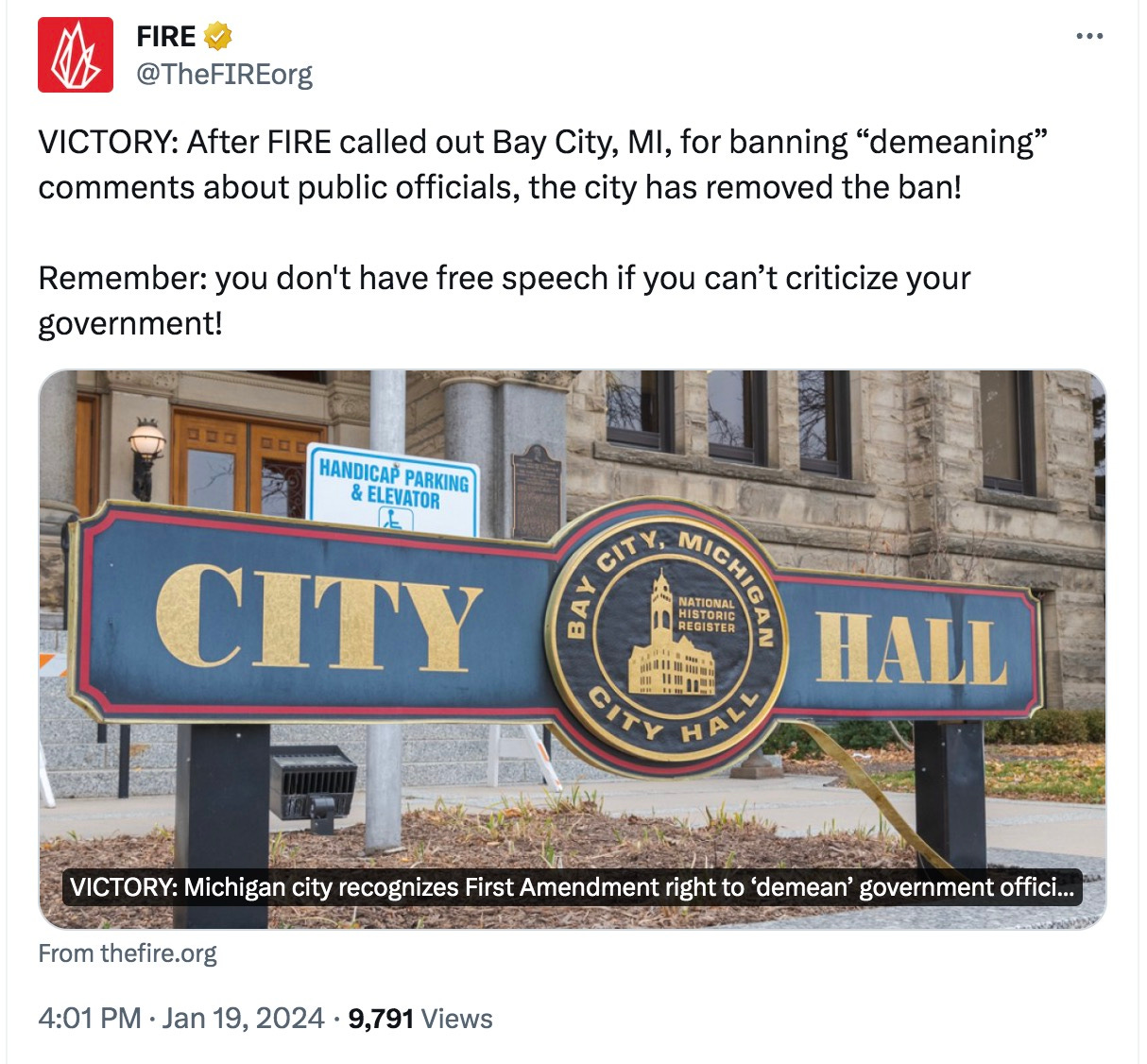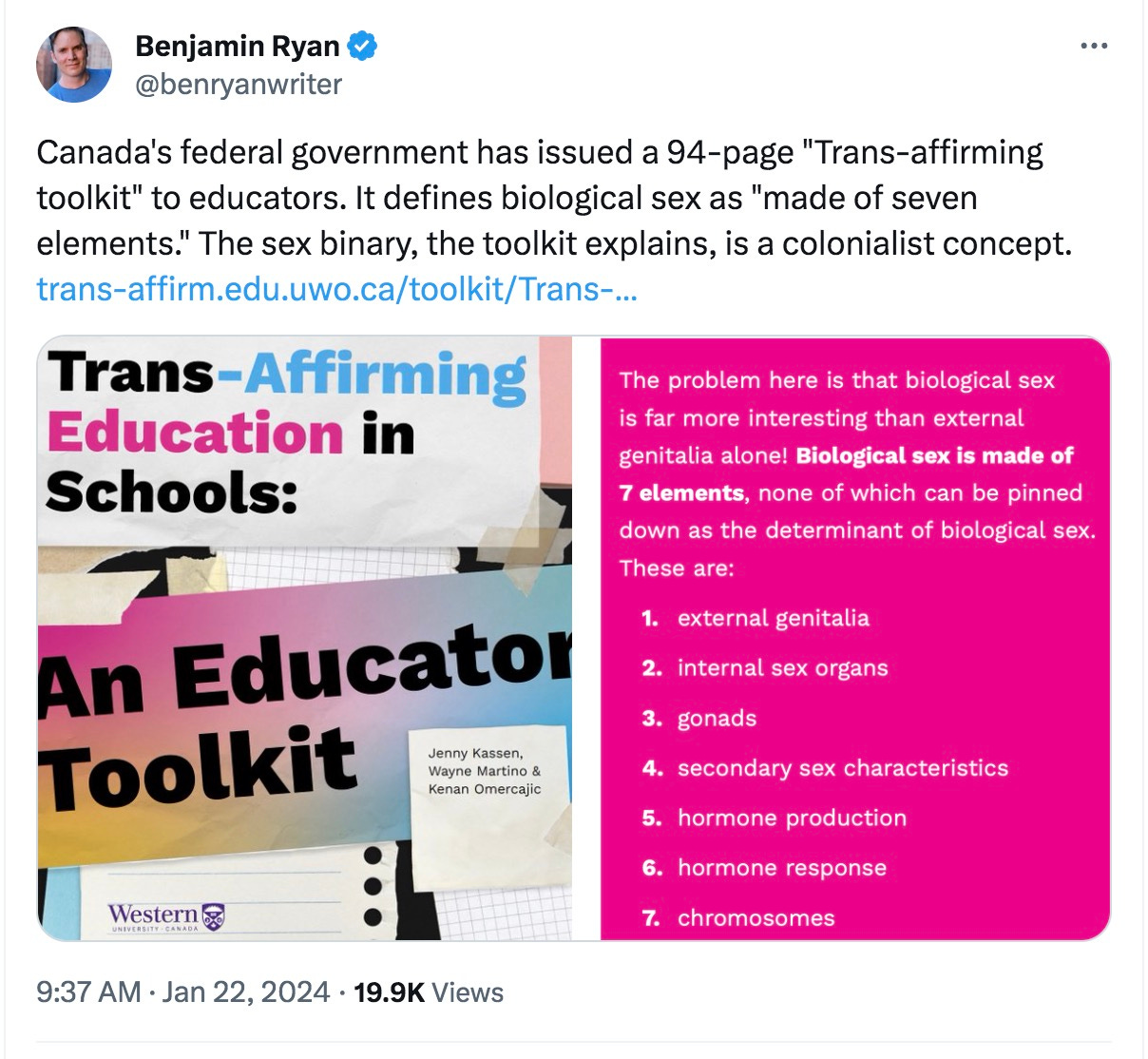E-Pluribus | January 22, 2024
Racism, according to Martin Luther King; when a joke is not a joke; and justifying DEI's means with DEI's ends.
A round-up of the latest and best musings on the rise of illiberalism in the public discourse:
John R. Wood, Jr.: Martin Luther King’s Understanding of Racism
Descriptions of MLK’s beliefs sometimes bring to mind the story of the blind men describing an elephant. At Quillette, John R. Wood, Jr., gives his take on how King saw racism, how his views evolved and how his proposed solutions differ from what is offered today.
Racism used to be an easy thing to define in America. We knew it was geographically concentrated in the southern states and fundamentally interpersonal. If there were racist laws on the books, it was because people were racist. Thanks to the teachings of the inspirational Martin Luther King Jr. and to the movement he led, that racism was defeated. Or so the story went. Today, however, the American progressive Left thinks of racism in terms that are less interpersonal and more systematic. Racism, in this view, is fundamentally resistant to moral persuasion. Most Americans today associate Dr. King with the paradigm of racism as an interpersonal problem. But, in his sophisticated and holistic understanding of racism, Dr. King’s thought bridges the two worldviews.
Dr. King was the product of his time, place, and social class. Given that he was born in Atlanta, Georgia on 15 January 1929, just before the start of the Great Depression, one might assume that Dr. King experienced the depths of poverty and racism from an early age.
[. . .]
Martin King Sr. was the son of a sharecropper who had witnessed racism in its simplest, most brutal form. Martin Luther King Jr. was spared that experience. Instead, he was left to piece together the nature of racism through the enquiring mind of a gentle child. Growing up in the Jim Crow South, he noticed that people treated him differently from white children, in ways that were subtly but painfully demeaning. For example, he was barred from attending a certain amusement park; a shop assistant refused to fit him for shoes for his growing feet. His parents had to explain why. He writes: “Every parent at some time faces the problem of explaining the facts of life to his child. Just as inevitably, for the Negro parent, the moment comes when he must explain to his offspring the facts of segregation.”
The Civil Rights movement of the mid-twentieth century was different from the antiracism movements that would follow in that it was overwhelmingly led by the black middle class, a group that had been expanding following the economic boom and new labor rights that followed the Second World War. More concerned with social opportunity and less affected by poverty than the majority of African Americans, the civil rights activists saw racial integration as their key social goal.
As sociologist William Julius Wilson has explained, “One major effect of the changes in the black occupational structure after 1940 was the revival of the integrationist ideology and concern for civil rights that had preoccupied black leaders prior to … the turn of the century.” The educated black leadership of the Reconstruction Era had tried to make desegregation a reality—but their idealistic project could not survive the hard realities of the resurgence of racial oppression in the post-war South.
Read it all.
Peter Suderman: Comedy's Truthiness Problem
The book of Proverbs says, “Like a madman who throws firebrands, arrows, and death is the man who deceives his neighbor and says, ‘I am only joking!”” Comedy has always contained a mixture of truth and fiction, but in today’s politicized environment, some comedians are trying to have it both ways, Peter Suderman writes for Reason.
In October 2005, Stephen Colbert invented a new word: truthiness.
In a short monologue for The Colbert Report, a satirical show where the comedian played a caricature of a conservative blowhard cable news anchor, he took issue with an approach to news that relied on facts and credible sources. "I don't trust books," Colbert said. "They're all fact, no heart. And that's exactly what's pulling our country apart today." Truthiness emanated from feeling rather than hard evidence, affirming beliefs backed by strong emotions.
[. . .]
Truthiness entered the popular lexicon. Today, multiple dictionaries include the word. The general concept, sometimes but not always attached to the word, has become a prominent and recurring criticism of right-wing politics and journalism. Broadly speaking, the argument was that the Republican Party and the American right consistently ignored fact-based rigor when such rigor would prove inconvenient. As political discussion migrated to social media, the critique followed, with Democrats increasingly prone to warning about misinformation and disinformation online.
[. . .]
Like [Stephen] Colbert, [Hasan] Minhaj is a comedian by trade—he has two Netflix specials to his credit. And like Colbert, Minhaj often wields his comedy to political ends. Minhaj is Indian-American, and his stand-up specials tell personal stories of racism and mistreatment. He frequently criticizes former President Donald Trump and the post-9/11 domestic security apparatus.
[. . .]
One story from the Netflix specials revolves around a man who became close with Minhaj, his family, and their mosque in 2002. The man, dubbed "Brother Eric," was white; he claimed to be a Muslim convert. After insinuating himself into their lives, Minhaj said, Brother Eric tried to coax some of the young men at the mosque into talking about jihad.
Minhaj recounts believing that Eric was a law enforcement informant; as a sort of gag, Minhaj says he told Brother Eric that he hoped to get a pilot's license. This resulted in a visit from the police, as Minhaj told it, who knocked his head into the hood of a police car. Years later, Minhaj says his family watched a news account in which a man resembling Brother Eric was revealed to be an FBI informant. The young Minhaj, it seems, had seen through the ruse.
Almost none of this is true. There was a man resembling Brother Eric who acted as an FBI informant. But as Malone reported, he was in prison in 2002 and didn't begin working with the feds until 2006. He did no work in the area Minhaj's story was said to have taken place.
In other words, the time, the place, and specifics of Minhaj's personal experience—his eyewitness account, leading to a supposed violent encounter with police—were totally fabricated.
[. . .]
Minhaj, confronted with reported evidence that many of his stories have been false or heavily exaggerated, defended his work. "Every story in my style is built around a seed of truth," he told Malone. "My comedy Arnold Palmer is seventy percent emotional truth—this happened—and then thirty percent hyperbole, exaggeration, fiction."
Emotional truth. Put another way, Minhaj's argument was that his stories didn't need to be actually true because they felt true. Minhaj was defending truthiness as good and righteous, so long as it was in service of the proper sort of political narrative. He wasn't just reporting the news to you; he was feeling the news at you.
Read the whole thing.
Caroline Elkins, Frances Frei and Anne Morriss: Critics of D.E.I. Forget That It Works
Whether or not DEI “works” depends on what it’s intended to accomplish. And even if it does, that doesn’t necessarily prove the ends justify the means. Writing at the New York Times, Caroline Elkins, Frances Frei and Anne Morriss argue that DEI does work by broadening the networks of those tasked with filling positions beyond typical boundaries. But, the three say, the process must be open and transparent and avoid the “identity” focus that drives much of the opposition, though their essay is light on specifics.
Support for corporate and academic diversity, equity and inclusion efforts appears to be shrinking, even though most people want the same thing: competitive organizations where everyone who shows up to work has a fair shot at success.
[. . .]
Inclusion, as we define it, creates the conditions in which everyone can thrive and where our differences as varied, multidimensional people are not only tolerated but also valued. A willingness to pursue the benefits of D.E.I. — the full participation and fair treatment of all team members — renders organizational wholes greater than the sum of their parts.
[. . .]
Inclusion work, done well, seeks to scale these kinds of results. Among other payoffs, organizations that get inclusion right at scale seem to be smarter, more innovative and more stable. One explanation is that they can see their competitive landscape — threats, risks, opportunities — more clearly and have greater access to the full knowledge base of their people.
But achieving gains like this can feel elusive when the will to participate in D.E.I. is waning. It can be tempting to put in place superficial fixes to achieve the optics of inclusion — a primary concern of D.E.I. critics — such as reserving roles for specific demographics. This is often illegal and rarely helpful, and it provides at least one area of broad agreement in this polarized debate: a distaste for hiring and promotion schemes based on an individual’s identity. A way to correct for these concerns is inclusive recruitment processes and rigorous, transparent selection criteria that everyone understands. It is not to scale back investments in inclusion, which would restrict our ability to build healthy, dynamic organizations.
Inclusion work is a way to create the conditions where people you don’t already know — those who are separated from you by more than one or two degrees — can succeed. For example, many U.S. tech companies have successfully created workplaces where young, straight, white men they know can thrive, but have a harder time recruiting, developing, promoting and retaining women, people of color, people from the L.G.B.T.Q.+ community, people over the age of 35 and the young, straight, white men they don’t know. Organizations with these outcomes are typically relying too much on familiar networks — the people they know — and when they find someone good enough in those networks, they stop looking.
Read it all here.
Around Twitter (X)
What is activism? Steve McGuire thinks that trying to change society qualifies, but this dean at the University of Alberta begs to differ. (Click for video.)
The Declaration of Independence said of King George: “a Prince whose character is thus marked by every act which may define a Tyrant, is unfit to be the ruler of a free people.” An American city banning “demeaning” comments about public officials clearly violates the spirit of the Declaration. The Foundation for Individual Rights & Expression could not agree more:
And finally, Canada continues its assault on biology:




